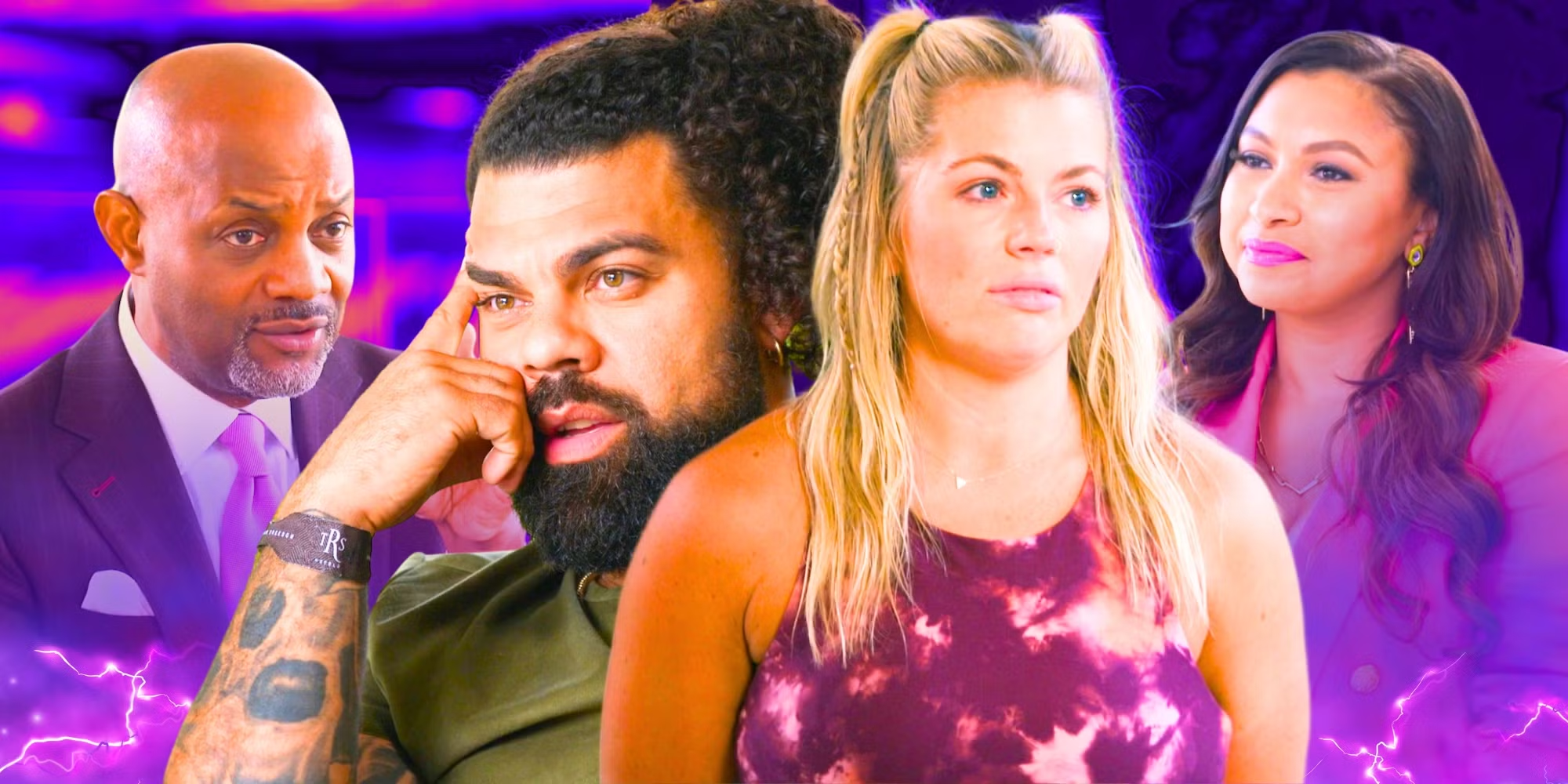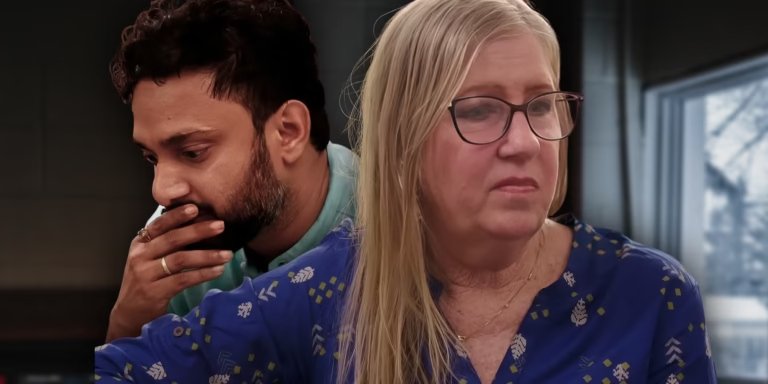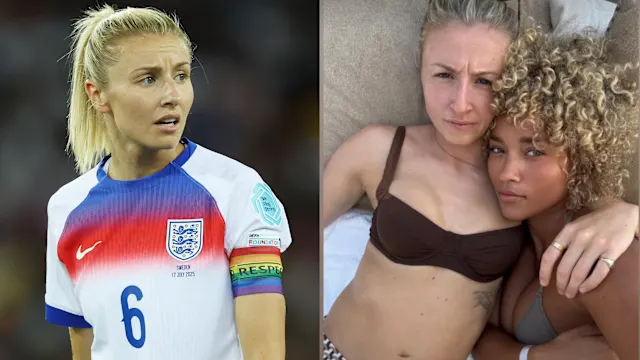
Married At First Sight: Michelle Tomblin’s Harsh Attitude Toward David Trimble – Is It Enough to Shake Her Villain Reputation?
Married At First Sight (MAFS) is notorious for its drama, emotional stakes, and intense relationships. Couples are paired together by experts, but not all of them form the lasting bonds that the show intends. Along with the high emotions and tension, some cast members become divisive figures, quickly earning the title of “villain” in the eyes of viewers. Michelle Tomblin, a participant in one of the most recent seasons, has earned such a reputation due to her harsh attitude toward her husband, David Trimble.
Michelle’s behavior has raised eyebrows, particularly with her direct and cutting remarks towards David. But in her defense, Michelle has recently opened up about the reasons behind her actions, which she believes may help the audience understand her better. Does this explanation soften her villain image, or is her harshness something that’s simply inexcusable regardless of context? Let’s explore both sides.
The Nature of the Villain on MAFS
Before diving into Michelle’s actions specifically, it’s important to understand the concept of the “villain” on Married At First Sight. While many reality TV shows have a villain archetype, MAFS takes it to a unique level because it centers around relationships. The “villain” is often someone who challenges or upends the idealized notion of what a healthy relationship should look like on the show. It’s not uncommon for contestants who display frustration, harshness, or a lack of connection with their partner to be painted as villains, especially when the public judges the situation from a limited, edited perspective.
This archetype is not always a clear-cut label, though. Some participants gain this reputation simply due to editing, where certain moments are highlighted over others to create a narrative. Sometimes, it’s an exaggerated response to a complex emotional situation that escalates throughout the series. Other times, it’s a reflection of someone’s true personality, which just doesn’t mesh well with their partner—or with public expectations.
In Michelle’s case, her portrayal as the “villain” was not solely because of her rough treatment of David but also because of her strong reactions and no-nonsense attitude. She often seemed unwilling to sugarcoat her feelings, which made her stand out compared to the more traditional “romantic” participants who tried to maintain diplomacy at all times.
Michelle’s Harshness Towards David: The Root of the Conflict
David Trimble, her husband on the show, seemed to be the type of person who valued clear communication and effort in a relationship. From the start, Michelle’s cold and direct attitude toward him set the tone for their relationship. She was not shy about expressing her dissatisfaction with his behavior, often citing his lack of initiative, emotional intelligence, or communication skills.
One of Michelle’s key complaints was David’s perceived emotional distance. Despite the experts’ guidance, she felt that he was not as invested in their marriage as she was. This mismatch in emotional engagement likely amplified Michelle’s frustrations. For someone like Michelle, who might have been looking for more direct communication or an emotional connection, David’s laid-back and less expressive nature may have felt like a rejection.
But Michelle’s reaction went beyond mere disappointment—it was sharp, critical, and often public. She wasn’t afraid to call out David on their issues in front of others, sometimes with a biting tone. Her candidness could be seen as a sign of strength or assertiveness, but it also made her seem unsympathetic to David’s perspective. And in the context of a show that thrives on idealizing romantic partnerships, her stance often appeared cold and unyielding.
However, Michelle has since explained that her harshness stemmed from feeling unappreciated and misunderstood. In interviews and follow-up discussions, she’s clarified that she wasn’t being intentionally cruel, but instead was reacting to what she saw as David’s inability to meet her emotional needs. Michelle felt she had been patient and understanding for a long time, and her outbursts were her way of voicing her frustrations when she reached a breaking point.
Is Michelle’s Explanation Enough to Shake Her Villain Reputation?
Now that Michelle has opened up about her reasons for her behavior, does it change the way viewers perceive her? Does her explanation justify her actions, or does it merely reveal more layers to her personality that still lead to her “villain” status?
- The Complexity of Emotion
Michelle’s explanation is rooted in her emotional needs. She didn’t feel seen or heard by David, and that led her to act out. Many people, especially those in emotionally charged situations like a televised experiment, struggle to articulate their needs calmly and constructively. The nature of the show, where everything is amplified for the cameras, may have escalated her frustrations. Understanding that her harshness came from a place of unmet emotional needs might humanize her for some viewers. She wasn’t simply being mean for the sake of drama—she was lashing out because she felt unappreciated. - The Perception of Cruelty
However, this explanation might not be enough to excuse Michelle’s behavior for everyone. Some viewers may still see her actions as unnecessarily harsh. Her biting remarks and unrelenting criticism could be interpreted as cruelty, especially in a context where David may not have been fully aware of the depth of her frustrations. While it’s easy to empathize with someone who feels emotionally neglected, there is a fine line between assertiveness and aggression. Whether Michelle crossed that line is subjective. - The Editing and Narratives of Reality TV
The way Michelle’s story was presented to the public also plays a significant role in her “villain” status. Reality shows like MAFS rely heavily on editing to craft a narrative that keeps viewers engaged. It’s entirely possible that Michelle’s moments of vulnerability and depth were overshadowed by scenes highlighting her harshest interactions with David. Without the full context, some audience members might only see a one-dimensional version of Michelle—leading them to reinforce her villain status. - Is It Enough for Redemption?
Ultimately, Michelle’s explanation might be enough to shift her public image if viewers are willing to look beyond the harsh moments and see her as a complex person. For those who believe in redemption, understanding Michelle’s backstory and emotional struggles could be enough to forgive her attitude toward David. However, for those who prioritize the ideal of “perfect marriage” portrayed on MAFS, Michelle’s behavior might be too much to shake off.




